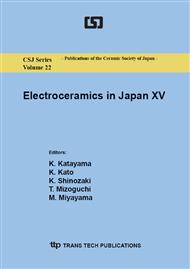p.231
p.237
p.241
p.245
p.249
p.253
p.258
p.262
p.266
Low-Temperature Processing and Optical Hydrogen Gas Sensing Property of Pd-Loaded Titania Coating onto Flexible Plastic Substrate
Abstract:
Transparent titania coating was formed onto a flexible polycarbonate plastic substrate by low-temperature fabrication process below 100 °C consisting of a sol-gel technique and a hot water treatment method. The titania coating with high transparency showed a good photocatalytic activity under ultraviolet (UV) light irradiation. Palladium metal acts as a catalyst for dissociative adsorption of hydrogen gas at room temperature under an atmospheric pressure. The palladium catalyst was deposited on the photocatalytic titania coating by a photodeposition process at room temperature under UV-light irradiation. The flexible polycarbonate plastic sheet with semitransparent palladium-deposited titania coating works as an optically readable hydrogen gas sensor which can operate at room temperature.
Info:
Periodical:
Pages:
249-252
DOI:
Citation:
Online since:
July 2013
Authors:
Price:
Сopyright:
© 2013 Trans Tech Publications Ltd. All Rights Reserved
Share:
Citation:


